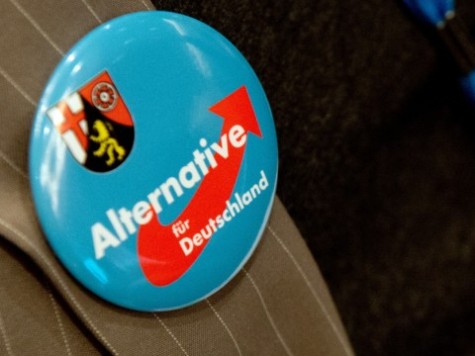Germany’s Eurosceptic Party, Alternative for Germany (AfD), has come third in a nationwide poll for the first time, making it the leading opposition party in Germany, the Telegraph has reported. The party is continuing to build on success after taking seats from more established parties in three regional Parliaments over the last few weeks, including Chancellor Angela Merkel’s Christian Democrats.
AfD’s rising popularity mirrors trends in other European countries, where Eurosceptic challengers are increasingly making inroads into the support enjoyed by hitherto leading parties. Although AfD doesn’t advocate German withdrawl from the European Union, it does want to see the Eurozone dismantled and powers repatriated from Brussels to Berlin.
The poll, conducted by Forsa for RTL and Stern magazine put support for AdF at ten percent, behind the Christian Democrats on 42 percent and the Social Democrats on 22 percent of decided voters. The Left party came in at nine percent, and the Greens at eight, with the remaining seven percent split across a number of smaller parties. However, 28 percent of those asked were undecided swing voters, meaning that nearly a third of Germany’s voters are still open to persuasion by the parties. Germany’s next general election is due to take place at the end of 2017.
Last month, AfD polled 10 percent of the vote in the Thuringia State parliamentary elections, and 12 percent in the equivalent Brandenburg elections, making the group the fourth largest in both parliaments, prompting AfD leader Bernd Lucke to exclaim “We are the force that’s renewing the political landscape”.
And two weeks previously the party scored a solid 9.7 percent in the Saxony election. Following the result in Saxony, Frauke Petry, the 39-year-old businesswoman who headed the AfD’s Saxony election campaign called the result “a sign that Frau Merkel should finally take the AfD seriously.”
Variously labelled “Germany’s Tea Party” or “the German Ukip”, AfD was launched by some disgruntled Christian Democrats, tired of the party abandoning its traditional position on the economy. The party is predominantly led by classical liberal academics and industrialists determined to see Germany unencumbered by the unworkable Euro project.
“A country is responsible for its own debts and the stability of its own banks. In order to save the euro they have pushed this overboard. That disturbs me,” says one of their seven MEPs Hans-Olaf Henkel, who before entering politics was the head of IBM operations in Europe, the Middle East and Africa.
The party’s slogan at the European elections was “Mut zu Deutschland!”: ‘Courage to stand up for Germany!’ In the European Institutions, such sentiments are frowned upon. Merkel herself has said that they go entirely against “the European spirit” of compromise, consensus, and “solidarity” across the EU.
Yet For the AfD, standing up for Germany means “an EU of sovereign states supporting human rights, democracy and the values of the Christian West; [a stop to] excessive EU centralism, bureaucracy, and a common currency that leads to rescuing incompetent banks, to frustrated jobless young people and to minimal pensions.”
Earlier this month on a trip to the US, Ukip leader Nigel Farage told Breitbart News that in England, “we believe in democracy, we believe in the rule of law, we created the Magna Carta, these are what it means to be British.”

COMMENTS
Please let us know if you're having issues with commenting.